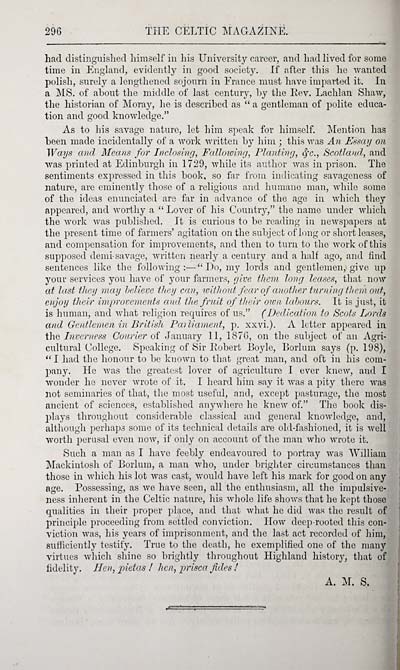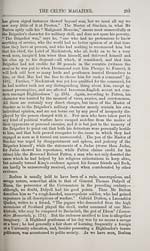Blair Collection > Celtic magazine > Volume 2
(306)
Download files
Complete book:
Individual page:
Thumbnail gallery: Grid view | List view

296 THE CELTIC MAGAZINE.
had distinguislied liimself in his University career, and had lived for some
time in England, evidently in good society. If after this he wanted
polish, snrelj'' a lengthened sojourn in Erance must have imparted it. In
a ]\IS. of about the middle of last century, by the Eev. Lachlan Shaw,
the historian of Moray, he is described as " a gentleman of polite educa-
tion and good knowledge."
As to his savage nature, let him speak for himself. j\Iention has
been made incidentally of a work written by him ; this was A}i Essay on
Waijs and Means for Indosing, Falloxoincj, Plantivg, ^'c, Scotland, and
was printed at Edinburgh in 1729, while its author was in prison. The
sentiments expressed in this book, so far from indicating savageness of
nature, are eminently those of a religious and humane man, while some
of the ideas enunciated are far in advance of the age in which they
appeared, and worthy a " Lover of his Country," the name under which
the Avork was published. It is curious to be reading in neAvspapers at
the present time of farmers' agitation on the subject of long or short leases,
and compensation for improvements, and then to turn to the work of this
supposed demi- savage, Avritten nearly a century and a half ago, and find
sentences like the following: — "Do, my lords and gentlemen, give up
your services you have of your farmers, (jive them long leases, that now
at last thci/ may helieve thpy can, without fear of anotlier turning tlicm out,
enjoy their improvements and the fruit of their own labours. It is just, it
is human, and Avhat religion requires of us." (Dedication to Scots Lords
and Gentlemen in British Pailiament, p. xxvi.). A letter appeared in
the I}iverness Courier of January 11, 1876, on the subject of an Agri-
cultural College. Speaking of Sir Robert Boyle, Borlum says (p. 198),
"I had the honour to be known to that great man, and oft in his com-
pany. He Avas the greatest lover of agriculture I ever kncAV, and I
Avonder he never Avrote of it. I heard him say it Avas a pity there AA^as
not seminaries of that, the most useful, and, except jjasturage, the most
ancient of sciences, established anyAvhere he knew of." The book dis-
plays throughout considerable classical and general knoAvledge, and,
although perhaps some of its technical details are old-fashioned, it is Avell
Avorth perusal even noAv, if only on account of the man who Avrote it.
Such a man as I have feebly endeavoured to portray Avas William
Mackintosh of Borlum, a man Avho, under brighter circumstances than
those in Avhich his lot was cast, Avould haA'^e left his mark for good on any
age. Possessing, as Ave have seen, all the enthusiasm, all the impulsive-
ness inherent in the Celtic nature, his Avhole life shoAvs that he kept those
qualities in their proper place, and that Avhat he did Avas the result of
principle proceeding from settled conviction. IIoav deep-rooted this con-
viction Avas, his years of imprisonment, and the last act recorded of him,
sufficiently testify. True to the death, he exemplified one of the many
virtues Avhich shine so brightly throughout Highland history, that of
fidelity. Hen, pietas ! hen, prisca fides !
A. :m. S.
had distinguislied liimself in his University career, and had lived for some
time in England, evidently in good society. If after this he wanted
polish, snrelj'' a lengthened sojourn in Erance must have imparted it. In
a ]\IS. of about the middle of last century, by the Eev. Lachlan Shaw,
the historian of Moray, he is described as " a gentleman of polite educa-
tion and good knowledge."
As to his savage nature, let him speak for himself. j\Iention has
been made incidentally of a work written by him ; this was A}i Essay on
Waijs and Means for Indosing, Falloxoincj, Plantivg, ^'c, Scotland, and
was printed at Edinburgh in 1729, while its author was in prison. The
sentiments expressed in this book, so far from indicating savageness of
nature, are eminently those of a religious and humane man, while some
of the ideas enunciated are far in advance of the age in which they
appeared, and worthy a " Lover of his Country," the name under which
the Avork was published. It is curious to be reading in neAvspapers at
the present time of farmers' agitation on the subject of long or short leases,
and compensation for improvements, and then to turn to the work of this
supposed demi- savage, Avritten nearly a century and a half ago, and find
sentences like the following: — "Do, my lords and gentlemen, give up
your services you have of your farmers, (jive them long leases, that now
at last thci/ may helieve thpy can, without fear of anotlier turning tlicm out,
enjoy their improvements and the fruit of their own labours. It is just, it
is human, and Avhat religion requires of us." (Dedication to Scots Lords
and Gentlemen in British Pailiament, p. xxvi.). A letter appeared in
the I}iverness Courier of January 11, 1876, on the subject of an Agri-
cultural College. Speaking of Sir Robert Boyle, Borlum says (p. 198),
"I had the honour to be known to that great man, and oft in his com-
pany. He Avas the greatest lover of agriculture I ever kncAV, and I
Avonder he never Avrote of it. I heard him say it Avas a pity there AA^as
not seminaries of that, the most useful, and, except jjasturage, the most
ancient of sciences, established anyAvhere he knew of." The book dis-
plays throughout considerable classical and general knoAvledge, and,
although perhaps some of its technical details are old-fashioned, it is Avell
Avorth perusal even noAv, if only on account of the man who Avrote it.
Such a man as I have feebly endeavoured to portray Avas William
Mackintosh of Borlum, a man Avho, under brighter circumstances than
those in Avhich his lot was cast, Avould haA'^e left his mark for good on any
age. Possessing, as Ave have seen, all the enthusiasm, all the impulsive-
ness inherent in the Celtic nature, his Avhole life shoAvs that he kept those
qualities in their proper place, and that Avhat he did Avas the result of
principle proceeding from settled conviction. IIoav deep-rooted this con-
viction Avas, his years of imprisonment, and the last act recorded of him,
sufficiently testify. True to the death, he exemplified one of the many
virtues Avhich shine so brightly throughout Highland history, that of
fidelity. Hen, pietas ! hen, prisca fides !
A. :m. S.
Set display mode to: Large image | Transcription
Images and transcriptions on this page, including medium image downloads, may be used under the Creative Commons Attribution 4.0 International Licence unless otherwise stated. ![]()
| Early Gaelic Book Collections > Blair Collection > Celtic magazine > Volume 2 > (306) |
|---|
| Permanent URL | https://digital.nls.uk/78483826 |
|---|
| Description | Volume II, 1877. |
|---|---|
| Shelfmark | Blair.3 |
| Attribution and copyright: |
|
| Description | A selection of books from a collection of more than 500 titles, mostly on religious and literary topics. Also includes some material dealing with other Celtic languages and societies. Collection created towards the end of the 19th century by Lady Evelyn Stewart Murray. |
|---|
| Description | Selected items from five 'Special and Named Printed Collections'. Includes books in Gaelic and other Celtic languages, works about the Gaels, their languages, literature, culture and history. |
|---|

